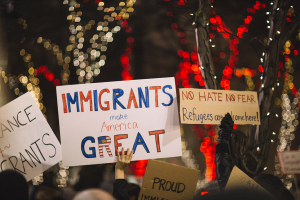Support migrant centric journalism today and donate

 • Watch This Video
• Watch This Video
Setting a significant precedent by an over-whelming 8-1 vote, the United States Supreme Court last week ruled strongly in favor of an immigrant's right not to be deported when charged with minor crimes.
For years, and especially recently, conservative factions in the government have used relatively minor offenses as an excuse to initiate and perform deportation proceedings against immigrants.
When charged with local crimes such as assault or minor drug possession, even green card, permanent residents of the U.S. have been deported in recent years, with some discussion recently about revoking the citizenship of immigrants under similar circumstances.
This summer, a British citizen with 8 years' permanent residency in the U.S. was deported for relatively minor domestic assault and disturbing the peace charges.
It has been a controversial issue with hot debate, which has not always been rational in nature. In some cases, deporting people accused and charged before they are convicted has been advocated. The circumstances of some actions, such as being charged with assault when there is credible evidence of self-defense, have also been questioned closely.
Now the Supreme Court, in Lopez v. Gonzales, case No. 05-547, has clearly ruled that deportation must meet the level of "aggravated felony," not only at the States level, but at the Federal level under the Immigration and Nationality Act to qualify for automatic deportation actions.
Significantly, it does not protect an immigrant from being deported entirely; a person may still face deportation proceedings if they are convicted of a felony crime at the States level. However, automatic deportation may not be invoked if there is no clear evidence of an aggravated felony under Federal law having taken place.
This sets the bar much higher for Federal officials to conduct deportation, vastly increasing the evidence for and the level of the crime to qualify. Federal officials may still seek deportation at their discretion.
The specific case regards Jose Antonio Lopez, a man with 16 years legal residency and a South Dakota grocery store owner, who had pleaded guilty in 1997 to a state felony charge of aiding and abetting another person's possession of cocaine. He was sentenced to five years in prison and released after 15 months, but was then found to be subject to mandatory deportation.
Mr. Lopez himself did not participate in handling or trafficking in the drug, but he admitted that he had told another person where they might be able to obtain it.
Justice David H. Souter's opinion contained something of a grammar lesson for prosecutors, saying that Mr. Lopez's crime could not be classified as the kind of "aggravated felony" that means the government must move for deportation without any discretion.
At issue was the phrase "felony punishable under the Controlled Substances Act."
The government held that that meant the crime could be a felony under state law, as long as it was also punishable under the act.
"But we do not normally speak or write the Government's way," Souter wrote. "We do not use a phrase like 'felony punishable under the [CSA]' when we mean to signal or allow a break between the noun 'felony' and the contiguous modifier 'punishable under the [CSA].' "
Neither, Souter wrote, should it be read as "if it said 'felony punishable under the CSA whether or not as a felony.'"
In analyzing the government's position that any offense "punishable" under the Controlled Substances Act therefore became a "drug trafficking" felony, Justice Souter said that "there are a few things wrong with this argument, the first being its incoherence." While "trafficking" ordinarily meant "some sort of commercial dealing," he said, "commerce, however, was no part of Lopez's South Dakota offense of helping someone else to possess."
Effectively, because an action might be punishable under a law does not necessarily define that action as a felony. Under most circumstances, Mr. Lopez's action (giving verbal direction to another person) is considered a misdemeanor offense, thus not making it mandatory for the government to deport him.
Most first-time simple possession offenses are punished as misdemeanors under the federal Controlled Substances Act; Mr. Lopez was never charged with even possession.
The State had argued that because in the State Mr. Lopez was charged with his action, it is a felony by law, although in most of the country it is not. At the federal level, Mr. Lopez's action is a misdemeanor. The State argued that his felony at the state level was merely punishable (as a misdemeanor) under Federal statutes, and therefore met the criteria to trigger automatic deportation.
Reading the law "the government's way ... would often turn simple possession into trafficking, just what the English language tells us not to expect, and that result makes us very wary of the government's position," Souter wrote.
"The court is saying people with drug-possession offenses who are now contributing members of society should have a chance to stay in the country, based on their rehabilitation," said Jayashri Srikantiah, a Stanford law professor who filed arguments in the case on behalf of national civil rights and immigrants' rights groups.
Immigration lawyers said the 8-1 ruling could affect thousands of legal immigrants around the nation who were facing automatic deportation for drug crimes classified as felonies in their states.
Defendants still can be deported after completing their drug sentences, but the ruling allows them to argue to an immigration judge that they should be allowed to remain because of their overall record, family support or other circumstances. Srikantiah said immigrants win their cases in court more often than not when allowed to present those arguments.
Numerous longtime legal residents have faced automatic deportation because of a drug-possession conviction, according to Srikantiah's brief. There was a decorated Navy veteran who briefly used drugs after his discharge; a 23-year resident with no criminal record who took her lawyer's advice to admit possessing someone else's marijuana; a Ukrainian Jew who fled religious persecution in 1993, was convicted of possessing heroin in 2000, then became a college honor student and drug rehabilitation counselor.
Nationwide, according to government figures, about 7,300 legal immigrants were deported for drug crimes in 2005, said Robert Long, lawyer for Mr. Lopez. He said it wasn't known how many of them were convicted in state courts, but he agreed that the ruling would give thousands a chance to fight deportation.
Under federal law, most drug-possession charges are misdemeanors punishable by a year in jail or less -- with the notable exception of possession of crack cocaine, which is a felony under federal law and thus grounds for mandatory deportation.
This was not the first time the Supreme Court has resisted a categorical interpretation of immigration law by the executive branch. In a unanimous opinion two years ago, the court ruled that contrary to the government's view, driving under the influence of alcohol was not a "crime of violence" for which an immigrant could be subjected to automatic deportation.
Despite Lopez's victory, his future is uncertain. He entered the United States illegally from Mexico in 1986 and became a legal permanent resident in 1990.
Lopez was deported to Mexico in January 2006, but will return to the United States now, where an immigration judge will decide whether he may remain in the country. The Supreme Court's decision makes Mr. Lopez eligible to apply for the administrative relief from deportation, known as "cancellation of removal," an option that was foreclosed by his designation as an aggravated felon.
Related:
• Punitive immigration laws under fire in the US• US Supreme Court rules against foreigner's rights
• US Supreme Court rules against long term illegal residency
• US Supreme Court Allows Deportation of British Man
• Catholics call for 'humane' immigration policies in the US
• US President Bush calls for expanded visa waiver program
• US unveils new citizenship test
• Legal immigrants to U.S. face green card logjam





















